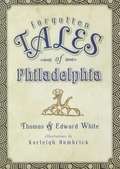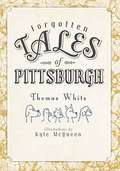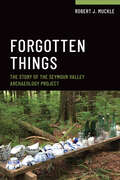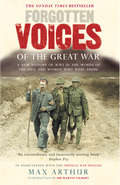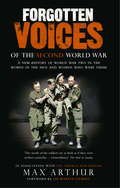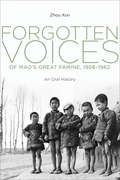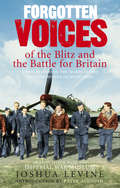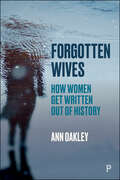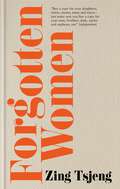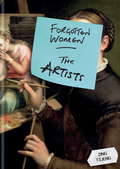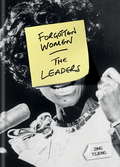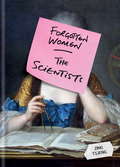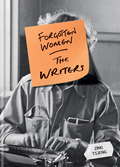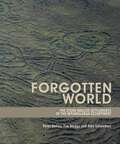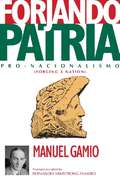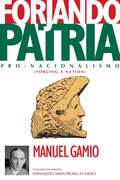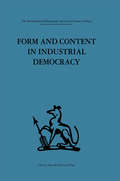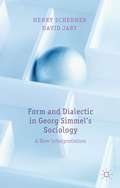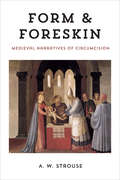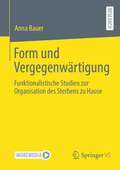- Table View
- List View
Forgotten Tales of Philadelphia
by Thomas White Edward WhiteRecounts little-known, obscure, bizarre, and sometimes funny tales from the Philadelphia area
Forgotten Tales of Pittsburgh
by Thomas WhiteSuch was the wisdom of the Pittsburgh Daily Gazette and Advertiser in 1866 when describing a railway boss's threat to decapitate a former employee. Pittsburgh has many such stories of strange but mostly true events. Local author Thomas White delves into these lost tales, from Lewis and Clark's inauspicious start involving an intoxicated boat builder to the death ray of inventor Nikola Tesla. A 1907 lion attack at Luna Park, death by spontaneous combustion, Jack the Ripper's rumored visit to the city and an umpire who was rescued from an angry crowd by Pirates players are all part of the forgotten history of the Steel City.
Forgotten Things: The Story of the Seymour Valley Archaeology Project (Teaching Archaeology: Case Studies in Research and the Culture of Fieldwork)
by Robert J. MuckleBased on a long-term archaeology project, Forgotten Things provides an account of working with field school students to discover and excavate archaeological sites, including early twentieth-century Japanese camps, in the Seymour Valley of British Columbia. The first book in the new Teaching Archaeology series, Forgotten Things gives students a real-world example of archaeological research in practice. It provides an overview of the Seymour Valley ArchaeologyProject from the initial phone call to the disposition of artifacts and archiving of records. The book takes the reader from the inception of the project through fieldwork, laboratory work, drawing inferences, and making the research meaningful. It delves into considerations that guide research design and methods, and it examines the culture of archaeological fieldwork. Through anecdotes, stories from the field, and extracts from field notes, Forgotten Things offers rare insight into the realities of archaeological research not often seen in archaeological studies.
Forgotten Voices Of The Great War
by Max ArthurIn 1960, the Imperial War Museum began a momentous and important task. A team of academics, archivists and volunteers set about tracing WWI veterans and interviewing them at length in order to record the experiences of ordinary individuals in war. The IWM aural archive has become the most important archive of its kind in the world. Authors have occasionally been granted access to the vaults, but digesting the thousands of hours of footage is a monumental task. Now, forty years on, the Imperial War Museum has at last given author Max Arthur and his team of researchers unlimited access to the complete WWI tapes. These are the forgotten voices of an entire generation of survivors of the Great War. The resulting book is an important and compelling history of WWI in the words of those who experienced it.
Forgotten Voices Of The Second World War: A New History of the Second World War in the Words of the Men and Women Who Were There
by Max ArthurThe Imperial War Museum holds a vast archive of interviews with soldiers, sailors, airmen and civilians of most nationalities who saw action during WW2. As in the highly-acclaimed Forgotten Voices of the Great War, Max Arthur and his team of researchers spent hundreds of hours digging deep into this unique archive, uncovering tapes, many of which have not been listened to since they were created in the early 1970s. The result will be the first complete oral history of World War 2. We hear at first from British, German and Commonwealth soldiers and civilians. Accounts of the impact of U.S. involvement after Pearl Harbour and the major effects it had on the war in Europe and the Far East is chronicled in startling detail, including compelling interviews from U.S. and British troops who fought against the Japanese. Continuing through from D-Day, to the Rhine Crossing and the dropping of the Atom Bomb in August 1945, this book is a unique testimony to one of the world's most dreadful conflicts. One of the hallmarks of Max Arthur's work is the way he involves those left behind on the home front as well as those working in factories or essential services. Their voices will not be neglected.
Forgotten Voices of Mao's Great Famine, 1958-1962
by Xun ZhouIn 1958, China's revered leader Mao Zedong instituted a program designed to transform his giant nation into a Communist utopia. Called the Great Leap Forward, Mao's grand scheme--like so many other utopian dreams of the 20th century--proved a monumental disaster, resulting in the mass destruction of China's agriculture, industry, and trade while leaving large portions of the countryside forever scarred by man-made environmental disasters. The resulting three-year famine claimed the lives of more than 45 million people in China. In this remarkable oral history of modern China's greatest tragedy, survivors of the cataclysm share their memories of the devastation and loss. The range of voices is wide: city dwellers and peasants, scholars and factory workers, parents who lost children and children who were orphaned in the catastrophe all speak out. Powerful and deeply moving, this unique remembrance of an unnecessary and unhindered catastrophe illuminates a dark recent history that remains officially unacknowledged to this day by the Chinese government and opens a window on a society still feeling the impact of the terrible Great Famine.
Forgotten Voices of the Blitz and the Battle For Britain: A New History in the Words of the Men and Women on Both Sides
by Joshua LevineDrawing material from the Imperial War Museum's extensive aural archive, Joshua Levine brings together voices from both sides of the Blitz and the Battle of Britain to give us a unique, complete and compelling picture of this turbulent time.In June 1940, British citizens prepared for an imminent German onslaught. Hitler's troops had overrun Holland, Belgium and France in quick succession, and the British people anticipated an invasion would soon be upon them. From July to October, they watched the Battle of Britain play out in the skies above them, aware that the result would decide their fate. Over the next nine months, the Blitz killed more than 43,000 civilians. For a year, the citizens of Britain were effectively front-line soldiers in a battle which united the country against a hated enemy.We hear from the soldiers, airmen, fire-fighters, air-raid wardens and civilians, people in the air and on the ground, on both sides of the battle, giving us a thrilling account of Britain under siege. With first-hand testimonies from those involved in Dunkirk and the Battle of Britain, Black Saturday on 7th September 1940 when the Luftwaffe began the Blitz, to its climax on the 10th May 1941, this is the definitive oral history of a period when Britain came closer to being overwhelmed by the enemy than at any other time in modern history.
Forgotten Wives: How Women Get Written Out of History
by Ann OakleyThroughout history, records of women's lives and work have been lost through the pervasive assumption of male dominance. Wives, especially, disappear as supporters of their husbands’ work, as unpaid and often unacknowledged secretaries and research assistants, and as managers of men’s domestic domains; even intellectual collaboration tends to be portrayed as normative wifely behaviour rather than as joint work. Forgotten Wives examines the ways in which the institution and status of marriage has contributed to the active ‘disremembering’ of women’s achievements. Drawing on archives, biographies, autobiographies and historical accounts, best-selling author and academic Ann Oakley interrogates conventions of history and biography-writing using the case studies of four women married to well-known men – Charlotte Shaw, Mary Booth, Jeannette Tawney and Janet Beveridge. Asking critical questions about the mechanisms that maintain gender inequality, despite thriving feminist and other equal rights movements, she contributes a fresh vision of how the welfare state developed in the early 20th century.
Forgotten Women
by Zing Tsjeng'To say this [book] is "empowering" doesn't do it justice. Buy a copy for your daughters, sisters, mums, aunts and nieces - just make sure you buy a copy for your sons, brothers, dads, uncles and nephews, too.' - indy100'Here's to no more forgotten women.' - Evening StandardForgotten Women reaches around the world and its history to rediscover, retell and reinstate the lives of over 190 important and significant women. From Neolithic times to modernity, Zing Tsjeng has traced the women who have shaped their age and revolutionised society. In this book lies the strength, lives and sacrifices of women who have refused to accept the hand they've been dealt and have changed the course of our futures accordingly.
Forgotten Women
by Zing Tsjeng'To say this [book] is "empowering" doesn't do it justice. Buy a copy for your daughters, sisters, mums, aunts and nieces - just make sure you buy a copy for your sons, brothers, dads, uncles and nephews, too.' - indy100'Here's to no more forgotten women.' - Evening StandardForgotten Women reaches around the world and its history to rediscover, retell and reinstate the lives of over 190 important and significant women. From Neolithic times to modernity, Zing Tsjeng has traced the women who have shaped their age and revolutionised society. In this book lies the strength, lives and sacrifices of women who have refused to accept the hand they've been dealt and have changed the course of our futures accordingly.
Forgotten Women: The Artists (Forgotten Women Ser.)
by Zing Tsjeng'To say this series is "empowering" doesn't do it justice. Buy a copy for your daughters, sisters, mums, aunts and nieces - just make sure you buy a copy for your sons, brothers, dads, uncles and nephews, too.' - IndependentThe women who shaped and were erased from our history.Forgotten Women is a new series of books that uncover the lost herstories of influential women who have refused over hundreds of years to accept the hand they've been dealt and, as a result, have formed, shaped and changed the course of our futures. From leaders and scientists to artists and writers, the fascinating stories of these women that time forgot are now celebrated, putting their achievements firmly back on the map.The Artists brings together the stories of 48* brilliant woman artists who made huge yet unacknowledged contributions to the history of art, including Camille Claudel, the extraordinarily talented sculptor who was always unfairly overshadowed by her lover, Rodin; Baroness Elsa von Freytag-Loringhoven, who has been claimed as the true originator of Marcel Duchamp's Fountain; and Ana Mendieta, the Cuban refugee who approached violence against women through her performance art before her own untimely death. With chapters ranging from Figurative to Photography, and Craft to Conceptual, this is an alternative guide to art history that demonstrates the broad range of artistic movements that included, and were often pioneered by, female artists who have been largely overlooked.*The number of Nobel-prize-winning women.
Forgotten Women: The Artists (Forgotten Women)
by Zing Tsjeng'To say this series is "empowering" doesn't do it justice. Buy a copy for your daughters, sisters, mums, aunts and nieces - just make sure you buy a copy for your sons, brothers, dads, uncles and nephews, too.' - IndependentThe women who shaped and were erased from our history.Forgotten Women is a new series of books that uncover the lost herstories of influential women who have refused over hundreds of years to accept the hand they've been dealt and, as a result, have formed, shaped and changed the course of our futures.The Artists brings together the stories of 48* brilliant woman artists who made huge yet unacknowledged contributions to the history of art, including Camille Claudel, the extraordinarily talented sculptor who was always unfairly overshadowed by her lover, Rodin; Baroness Elsa von Freytag-Loringhoven, who has been claimed as the true originator of Marcel Duchamp's Fountain; and Ana Mendieta, the Cuban refugee who approached violence against women through her performance art before her own untimely death. With chapters ranging from Figurative to Photography, and Craft to Conceptual, this is an alternative guide to art history that demonstrates the broad range of artistic movements that included, and were often pioneered by, female artists who have been largely overlooked.*The number of Nobel-prize-winning women.
Forgotten Women: The Leaders (Forgotten Women Ser.)
by Zing Tsjeng'To say this series is "empowering" doesn't do it justice. Buy a copy for your daughters, sisters, mums, aunts and nieces - just make sure you buy a copy for your sons, brothers, dads, uncles and nephews, too.' - indy100The women who shaped and were erased from our history.The Forgotten Women series will uncover the lost histories of the influential women who have refused over hundreds of years to accept the hand they've been dealt and, as a result, have formed, shaped and changed the course of our futures. The Leaders weaves together 48* unforgettable portraits of the true pioneers and leaders who made huge yet unacknowledged contributions to history, including:Grace O'Malley, the 16th century Irish pirate queenSylvia Rivera, who spearheaded the modern transgender rights movementAgent 355, the unknown rebel spy who played a pivotal role in the American RevolutionNoor Inayat Khan, who went undercover to spy for the French Resistance and became Nazi enemy no. 1Amina of Zazzau, the formidable ancient Muslim warrior queen of Northern NigeriaChapters including Rebels; Warriors; Rulers; Activists and Reformers shine a spotlight on the rebellious women who defied the odds, and the opposition, to change the world around them. *The number of Nobel-prize-winning women.
Forgotten Women: The Leaders (Forgotten Women)
by Zing TsjengSelected for the Evening Standard present gift guide of the year'To say this series is "empowering" doesn't do it justice. Buy a copy for your daughters, sisters, mums, aunts and nieces - just make sure you buy a copy for your sons, brothers, dads, uncles and nephews, too.' - indy100'Here's to no more forgotten women.' Evening StandardThe women who shaped and were erased from our history.The Forgotten Women series will uncover the lost histories of the influential women who have refused over hundreds of years to accept the hand they've been dealt and, as a result, have formed, shaped and changed the course of our futures. The Leaders weaves together 48* unforgettable portraits of the true pioneers and leaders who made huge yet unacknowledged contributions to history, including:Grace O'Malley, the 16th century Irish pirate queenSylvia Rivera, who spearheaded the modern transgender rights movementAgent 355, the unknown rebel spy who played a pivotal role in the American RevolutionNoor Inayat Khan, who went undercover to spy for the French Resistance and became Nazi enemy no. 1Amina of Zazzau, the formidable ancient Muslim warrior queen of Northern NigeriaChapters including Rebels; Warriors; Rulers; Activists and Reformers shine a spotlight on the rebellious women who defied the odds, and the opposition, to change the world around them. *The number of Nobel-prize-winning women.
Forgotten Women: The Scientists
by Zing Tsjeng'To say this series is "empowering" doesn't do it justice. Buy a copy for your daughters, sisters, mums, aunts and nieces - just make sure you buy a copy for your sons, brothers, dads, uncles and nephews, too.' - indy100'Here's to no more forgotten women.' Evening StandardThe women who shaped and were erased from our history.The Forgotten Women series will uncover the lost histories of the influential women who have refused over hundreds of years to accept the hand they've been dealt and, as a result, have formed, shaped and changed the course of our futures. The Scientists celebrates 48* unsung scientific heroines whose hugely important, yet broadly unacknowledged or incorrectly attributed, discoveries have transformed our understanding of the scientific world. Mary Anning, the amateur paleontologist whose fossil findings changed scientific thinking about prehistoric life Emmy Noether, dubbed "The Mighty Mathematician You've Never Heard Of"Ynés Mexía, the Mexican-American botanist who discovered over 500 new plant species Wangari Maathai, who started an environmental and ecological revolution in KenyaMargaret Sanger, the maverick nurse who paved the way for the legalization of contraceptionChapters including Earth & Universe; Biology & Natural Sciences; Medicine & Psychology; Physics & Chemistry; Mathematics and Technology & Inventions profile the female scientists who have defied the odds, and the opposition, to change the world around us.*The number of Nobel-prize-winning women.
Forgotten Women: The Scientists (Forgotten Women)
by Zing Tsjeng'To say this series is "empowering" doesn't do it justice. Buy a copy for your daughters, sisters, mums, aunts and nieces - just make sure you buy a copy for your sons, brothers, dads, uncles and nephews, too.' - indy100'Here's to no more forgotten women.' Evening StandardThe women who shaped and were erased from our history.The Forgotten Women series will uncover the lost histories of the influential women who have refused over hundreds of years to accept the hand they've been dealt and, as a result, have formed, shaped and changed the course of our futures. The Scientists celebrates 48* unsung scientific heroines whose hugely important, yet broadly unacknowledged or incorrectly attributed, discoveries have transformed our understanding of the scientific world. Mary Anning, the amateur paleontologist whose fossil findings changed scientific thinking about prehistoric life Emmy Noether, dubbed "The Mighty Mathematician You've Never Heard Of"Ynés Mexía, the Mexican-American botanist who discovered over 500 new plant species Wangari Maathai, who started an environmental and ecological revolution in KenyaMargaret Sanger, the maverick nurse who paved the way for the legalization of contraceptionChapters including Earth & Universe; Biology & Natural Sciences; Medicine & Psychology; Physics & Chemistry; Mathematics and Technology & Inventions profile the female scientists who have defied the odds, and the opposition, to change the world around us.*The number of Nobel-prize-winning women.
Forgotten Women: The Writers (Forgotten Women Ser.)
by Zing Tsjeng'To say this series is "empowering" doesn't do it justice. Buy a copy for your daughters, sisters, mums, aunts and nieces - just make sure you buy a copy for your sons, brothers, dads, uncles and nephews, too.' - IndependentThe women who shaped and were erased from our history.Forgotten Women is a new series of books that uncover the lost herstories of influential women who have refused over hundreds of years to accept the hand they've been dealt and, as a result, have formed, shaped and changed the course of our futures. From leaders and scientists to artists and writers, the fascinating stories of these women that time forgot are now celebrated, putting their achievements firmly back on the map.The Writers celebrates 48* unsung genius female writers from throughout history and across the world, including the Girl Stunt Reporters, who went undercover to write exposés on the ills of 1890s America; Aemilia Lanyer, the contemporary of Shakespeare whose polemical re-writing of The Bible's Passion Story is regarded as one of the earliest feminist works of literature; and Sarojini Naidu, the freedom fighter and 'Nightingale of India' whose poetry echoed her political desire for Indian independence.Including writers from across a wide spectrum of disciplines including poets, journalists, novelists, essayists and diarists, this is an alternative gynocentric history of literature that will surprise, empower, and leave you with a reading list a mile long.*The number of Nobel-prize-winning women.
Forgotten Women: The Writers (Forgotten Women)
by Zing Tsjeng'To say this series is "empowering" doesn't do it justice. Buy a copy for your daughters, sisters, mums, aunts and nieces - just make sure you buy a copy for your sons, brothers, dads, uncles and nephews, too.' - IndependentThe women who shaped and were erased from our history.Forgotten Women is a new series of books that uncover the lost herstories of influential women who have refused over hundreds of years to accept the hand they've been dealt and, as a result, have formed, shaped and changed the course of our futures. The Writers celebrates 48* unsung genius female writers from throughout history and across the world, including the Girl Stunt Reporters, who went undercover to write exposés on the ills of 1890s America; Aemilia Lanyer, the contemporary of Shakespeare whose polemical re-writing of The Bible's Passion Story is regarded as one of the earliest feminist works of literature; and Sarojini Naidu, the freedom fighter and 'Nightingale of India' whose poetry echoed her political desire for Indian independence.Including writers from across a wide spectrum of disciplines including poets, journalists, novelists, essayists and diarists, this is an alternative gynocentric history of literature that will surprise, empower, and leave you with a reading list a mile long.*The number of Nobel-prize-winning women.
Forgotten World: The Stone-Walled Settlements of the Mpumalanga Escarpment
by Peter Delius Tim Maggs Alex SchoemanIf you drive through Mpumalanga with an eye on the landscape flashing by, you may see, near the sides of the road and further away on the hills above and in the valleys below, fragments of building in stone as well as sections of stone-walling breaking the grass cover. Endless stone circles, set in bewildering mazes and linked by long stone passages, cover the landscape stretching from Ohrigstad to Carolina, connecting over 10 000 square kilometres of the escarpment into a complex web of stone-walled homesteads, terraced fields and linking roads. Oral traditions recorded in the early twentieth century named the area Bokoni – the country of the Koni people. Few South Africans or visitors to the country know much about these settlements, and why today they are deserted and largely ignored. A long tradition of archaeological work which might provide some of the answers remains cloistered in universities and the knowledge vacuum has been filled by a variety of exotic explanations – invoking ancient settlers from India or even visitors from outer space – that share a common assumption that Africans were too primitive to have created such elaborate stone structures. Forgotten World defies the usual stereotypes about backward African farming methods and shows that these settlements were at their peak between 1500 and 1820, that they housed a substantial population, organised vast amounts of labour for infrastructural development, and displayed extraordinary levels of agricultural innovation and productivity. The Koni were part of a trading system linked to the coast of Mozambique and the wider world of Indian Ocean trade beyond. Forgotten World tells the story of Bokoni through rigorous historical and archaeological research, and lavishly illustrates it with stunning photographic images.
Forjando Patria
by Fernando Armstrong-Fumero Manuel GamioOften considered the father of anthropological studies in Mexico, Manuel Gamio originally published Forjando Patria in 1916. This groundbreaking manifesto for a national anthropology of Mexico summarizes the key issues in the development of anthropology as an academic discipline and the establishment of an active field of cultural politics in Mexico. Written during the upheaval of the Mexican Revolution, the book has now been translated into English for the first time. Armstrong-Fumero's translation allows readers to develop a more nuanced understanding of this foundational work, which is often misrepresented in contemporary critical analyses. As much about national identity as anthropology, this text gives Anglophone readers access to a particular set of topics that have been mentioned extensively in secondary literature but are rarely discussed with a sense of their original context. Forjando Patria also reveals the many textual ambiguities that can lend themselves to different interpretations. The book highlights the history and development of Mexican anthropology and archaeology at a time when scholars in the United States are increasingly recognizing the importance of cross-cultural collaboration with their Mexican colleagues. It will be of interest to anthropologists and archaeologists studying the region, as well as those involved in the history of the discipline.
Forjando Patria: Pro-Nacionalismo
by Manuel GamioOften considered the father of anthropological studies in Mexico, Manuel Gamio originally published Forjando Patria in 1916. This groundbreaking manifesto for a national anthropology of Mexico summarizes the key issues in the development of anthropology as an academic discipline and the establishment of an active field of cultural politics in Mexico. Written during the upheaval of the Mexican Revolution, the book has now been translated into English for the first time. Armstrong-Fumero's translation allows readers to develop a more nuanced understanding of this foundational work, which is often misrepresented in contemporary critical analyses. As much about national identity as anthropology, this text gives Anglophone readers access to a particular set of topics that have been mentioned extensively in secondary literature but are rarely discussed with a sense of their original context. Forjando Patria also reveals the many textual ambiguities that can lend themselves to different interpretations. The book highlights the history and development of Mexican anthropology and archaeology at a time when scholars in the United States are increasingly recognizing the importance of cross-cultural collaboration with their Mexican colleagues. It will be of interest to anthropologists and archaeologists studying the region, as well as those involved in the history of the discipline.
Form and Content in Industrial Democracy: Some experiences from Norway and other European countries (International Behavioural And Social Sciences Ser. #Vol. 46)
by F E Emery Einar Thorsrud Eric TristTavistock Press was established as a co-operative venture between the Tavistock Institute and Routledge & Kegan Paul (RKP) in the 1950s to produce a series of major contributions across the social sciences. This volume is part of a 2001 reissue of a selection of those important works which have since gone out of print, or are difficult to locate. Published by Routledge, 112 volumes in total are being brought together under the name The International Behavioural and Social Sciences Library: Classics from the Tavistock Press. Reproduced here in facsimile, this volume was originally published in 1969 and is available individually. The collection is also available in a number of themed mini-sets of between 5 and 13 volumes, or as a complete collection.
Form and Dialectic in Georg Simmel's Sociology
by Henry Schermer David JaryThis volume focuses on Georg Simmel the 'sociologist', but it deals with more than his 'sociology' narrowly conceived. Against many previous English and American presentations of Simmel as an unsystematic theorist, this volume demonstrates that he operated with a systematic dialectical method in the analysis of social and cultural forms. Examples of social forms including fashion, the secret and money are presented as exemplifications of this method. Simmel's 'relational epistemology', his use of 'fictions' ('the philosophy of as if') and his largely neglected evolutionary thinking are also examined as aspects of his method. The volume locates Simmel's work historically, including the implications of his 'marginality' to the academy. The continuities seen in Simmel's work include his continuous concern with the dialectical tension between 'subjective culture' and 'objective culture'. The volume concludes with a reassessment of Simmel's relevance today. "
Form and Foreskin: Medieval Narratives of Circumcision
by A. W. StrouseWhy did Saint Augustine ask God to “circumcise [his] lips”? Why does Sir Gawain cut off the Green Knight’s head on the Feast of the Circumcision? Is Chaucer’s Wife of Bath actually—as an early glossator figures her—a foreskin? And why did Ezra Pound claim that he had incubated The Waste Land inside of his uncut member? In this little book, A. W. Strouse excavates a poetics of the foreskin, uncovering how Patristic theologies of circumcision came to structure medieval European literary aesthetics. Following the writings of Saint Paul, “circumcision” and “uncircumcision” become key terms for theorizing language—especially the dichotomies between the mere text and its extended exegesis, between brevity and longwindedness, between wisdom and folly. Form and Foreskin looks to three works: a peculiar story by Saint Augustine about a boy with the long foreskin; Sir Gawain and the Green Knight; and Chaucer’s Wife of Bath’s Tale. By examining literary scenes of cutting and stretching, Strouse exposes how Patristic treatments of circumcision queerly govern medieval poetics.
Form und Vergegenwärtigung: Funktionalistische Studien zur Organisation des Sterbens zu Hause
by Anna BauerDas eigene Zuhause gilt vielen nach wie vor als der ›ideale‹ Sterbeort. In mehreren Fallstudien zeigt der vorliegende Band am Beispiel der spezialisierten ambulanten Palliativversorgung (SAPV), wie das Sterben zu Hause in organisierte Formen übersetzt und professionell begleitet bzw. versorgt wird. Die Ergebnisse der Fallstudien zeigen, wie zwischen vielfältigen und zum Teil auch widersprüchlichen professionellen Anforderungen, aber auch den Erwartungen von Patient:innen und Angehörigen vermittelt werden kann. Durch die Analyse der beruflichen Perspektiven von Palliativärzt:innen und Palliative Care Fachkräften wird ersichtlich, wie die sich in Folge von Ausdifferenzierung und Spezialisierung immer weiter verselbstständigende medizinische und pflegerische Expertise im privaten Raum gegenüber einem ›Laienpublikum‹ aus Patient:innen und Angehörigen bewähren kann. Es wird beispielhaft am Thema der Palliativversorgung zu Hause aufgezeigt, wie die ›Produkte‹ eines Prozesses der funktionalen Differenzierung gesellschaftlich anschlussfähig werden.
